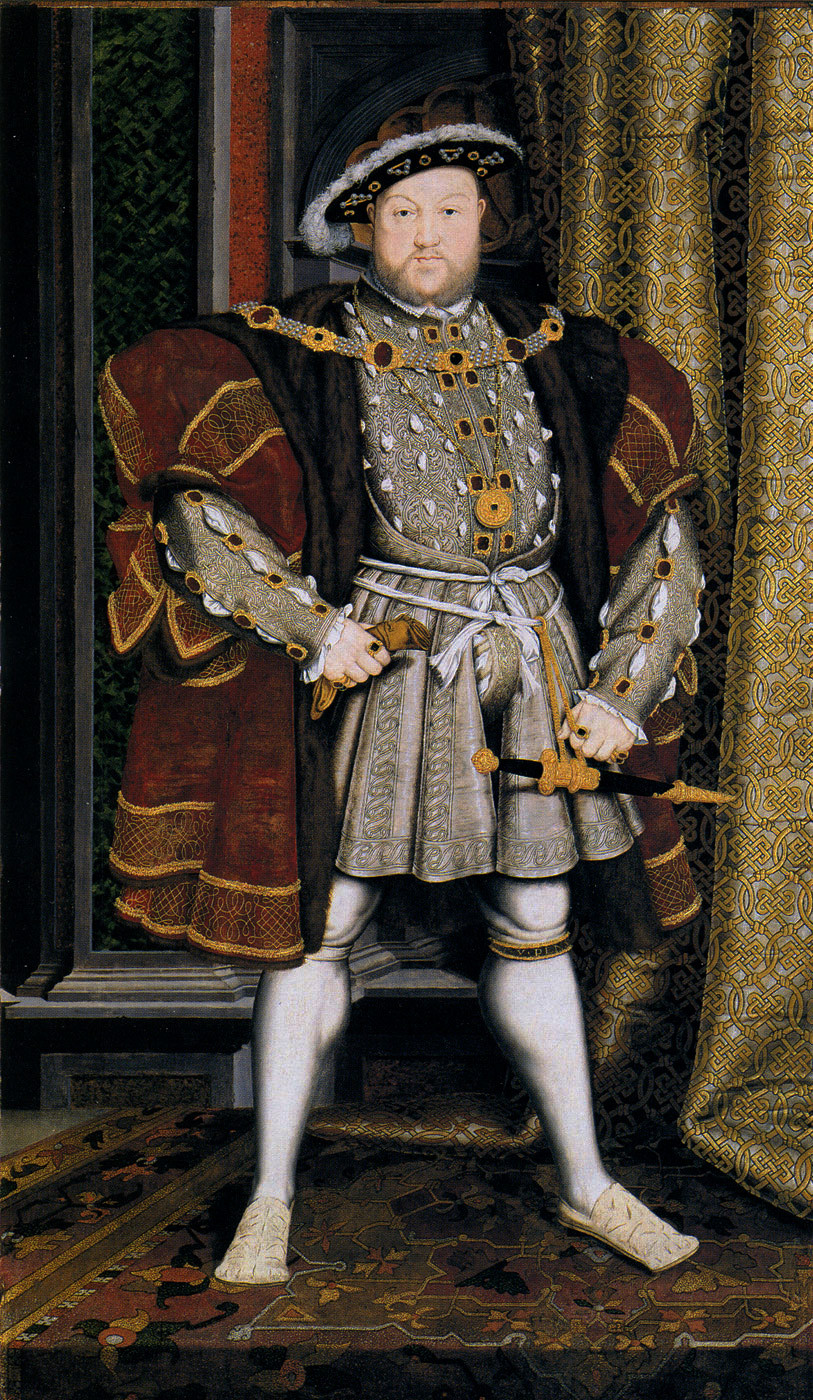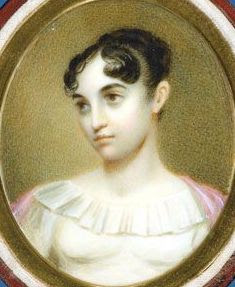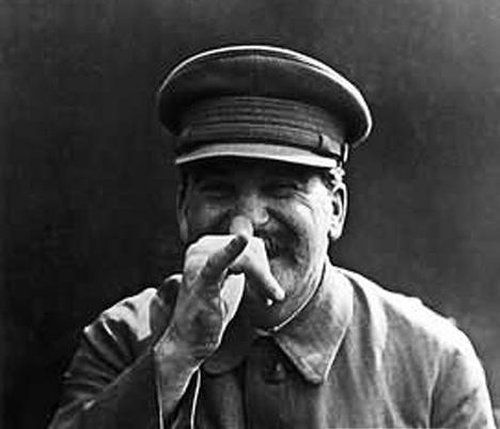Just in time for Father’s Day, this puff piece purports to list the 12 most doting dads in history. Its criteria for measuring paternal dotage are vague but seem to center on dads who educated their daughters when it was historically unfashionable to do so. Charlemagne (#10), Thomas More (#8), and Lt. Col. George Lucas (#7, not the one you’ve heard of) get mad props for being pioneers of women’s rights.
Based on that criteria, I’d add three more doting dads of history to their list:
#0. Henry VIII

Overlooking the small matter that he had her mother beheaded when she was nearly three years old, leaving her legally illegitimate and no longer a princess, Henry VIII was a doting father to his daughter, the future Elizabeth I. Through her, he became a pioneer of women’s rights. Though frequently absent due to a busy career of making merry, binge-gorging, hammering Papists and Lutherans, and having wives beheaded, Henry ensured that Elizabeth was “the best educated woman of her generation”. Elizabeth received a cutting edge humanist education from her governess Kate Ashley and her tutors William Grindal and Roger Ascham. Ascham wrote:
Yea, I believe, that beside her perfect readiness in Latin, Italian, French, and Spanish, she readeth here now at Windsor more Greek every day than some prebendary of this church doth read Latin in a whole week.
and
She talks French and Italian as well as English: she has often talked to me readily and well in Latin and moderately so in Greek. When she writes Greek and Latin nothing is more beautiful than her handwriting . . . she read with me almost all Cicero and great part of [Livy]: for she drew all her knowledge of Latin from those two authors. She used to give the morning to the Greek Testament and afterwards read select orations of Isocrates and the tragedies of Sophocles. To these I added St Cyprian and Melanchthon’s Commonplaces.
This dedication to learning may have been a result of Henry being the second son of Henry VII instead of the firstborn. Henry only became Prince of Wales at age 10 when his older brother Arthur died. Before then, Henry had been educated to become a cleric. Says Wikipedia:
Henry was given a first-rate education from leading tutors, becoming fluent in Latin, French, and Spanish…Henry was an intellectual. The first well-educated English king, he was thoroughly at home in his well-stocked library; he personally annotated many books and wrote and published his own book…He was an accomplished musician, author, and poet; his best known piece of music is “Pastime with Good Company” (“The Kynges Ballade”). He is often reputed to have written “Greensleeves” but probably did not.
Given that Henry’s primary obsession was acquiring a legitimate male heir in order to avoid another bloody civil war like the War of the Roses that had brought his father to the throne, his education of his daughter is striking. He could have passed on this training since he saw them as triggers of civil strife rather than rulers. He could have followed the usual contemporary practice and stopped at teaching his daughter enough sewing, curtsying, and agreeable small talk to successfully peddle them as brides in the European royal meat market.
Elizabeth herself, inasmuch as details have come down to us, idolized her father and modeled her kingship after his looming example.
Whatever feelings she had on Mother’s Day are lost to history.

# -1. Aaron Burr, Jr.

The lasting impression that Col. Aaron Burr left on his contemporaries was such that Col. Alexander Hamilton allowed his world historical nemesis Thomas Jefferson to become president so that Burr couldn’t become president.
This would be not be the last lasting impression that Col. Burr left on Col. Hamilton.
Burr’s relations with Jefferson were strained enough that Jefferson violated the U.S. Constitution regularly as he attempted to rid himself of his former Vice President. Burr’s overall contribution to the development of U.S. constitutional law is as long as it is unusual:
- Burr’s possible intrigues to have himself elected president over Jefferson even though he and Jefferson were nominally on the same ticket as president and vice-president led to the adoption of the Twelfth Amendment to the Constitution. This amendment required that distinct and separate votes be cast for president and vice-president by the presidential electors. Before this, the top two recipients of votes in the Electoral College became president and vice-president. This led to awkward situations like Jefferson being John Adam’s vice-president even though he was the leader of the opposition or Burr having the opportunity to become president even though he was the vice-presidential nominee because he and Jefferson tied in the Electoral College.
- Burr preserved judicial review of legislative and executive acts by the United States Supreme Court when he fought off Jefferson’s attempts to pack the court. Jefferson and his Congressional henchmen were trying to impeach and remove Washington and Adams appointees from the Federal bench so they could be replaced by politically reliable Jefferson placemen. Burr’s role in presiding as President of the Senate over the Justice Samuel Chase’s impeachment trial through his powerful oratory, his treatment of it as a serious judicial process by manipulating the atmospherics of the Senate, and his dignified conduct heavily contributed to the Senate acquitting Chase even though it had a Republican majority tightly under Jefferson’s iron thumb. Burr’s role was all the more curious because he was a lame-duck vice president and happened to be under indictment by both the states of New York and New Jersey for the murder of Col. Hamilton.
- After the nebulous Burr Conspiracy in 1805, Jefferson had Burr charged with treason. Burr and his lawyers responded by subpoenaing Jefferson himself for testimony and papers. Jefferson, noted defender of open government and a free press, responded by inventing and invoking “executive privilege”. This merely allowed the presiding judge, Jefferson nemesis John Marshall, Chief Justice of the United States, the first of many opportunities to use Burr’s trial to needle his hated cousin Tommy. Marshall owed Burr a favor anyway since he’d have been next on Jefferson’s impeachment express if Justice Chase had be removed from the Supreme Court. Though Jefferson hemmed and hawed and used all of the resources his role as a machine boss gave him, Marshall ultimately used a narrow interpretation of the Constitution’s definition of treason and its requirement for two witnesses to the act to get Burr off with an acquittal.
One unambiguous spot in Burr’s life was his education of his only (legitimate) child Theodosia. Says Wikipedia:
Her education was very closely supervised by her father who stressed mental discipline. This type of tutoring was very rarely given to girls of Theodosia’s generation. In addition to the more conventional subjects such as French, music, and dancing, the young “Theo” began to study arithmetic, Latin, Greek, and English composition. She applied herself to English in the form of letters to Aaron Burr, which were returned to her promptly, with the inclusion of detailed criticism.
When Theodosia was 11, her mother died. After this event her father closely supervised his daughter’s social education. Specifically this included training in an appreciation of the arts and the intangibles of relating to other people. By the age of 14 Theodosia began to serve as hostess at Richmond Hill, Aaron Burr’s stately home…
Burr may have harked back to an earlier age in arranging his daughter’s marriage:
On February 2, 1801 she married Joseph Alston, a wealthy land owner and politician from South Carolina. They honeymooned at Niagara Falls, the first recorded couple to do so. Alston was governor of South Carolina and possessed a large rice plantation. It has been conjectured that there was more than romance involved in this union. Aaron Burr agonized intensely and daily about money matters, particularly as to how he would hold on to the Richmond Hill estate. It is thought that his daughter’s tie to a member of the Southern gentry might relieve him of some of his financial burdens. The marriage to Alston meant that Theodosia would become prominent in South Carolina social circles.
However, the bond between daughter and American supervillain seems to have been strong, with Theodosia standing by her old man as he was tried for treason and petitioning the Madison Administration to allow Burr to return from his European exile. However, the bond was terminated by Theodosia’s mysterious disappearance along with all hands of the good ship Patriot in January of 1812 as it sailed from South Carolina to New York. Burr lived on as a enigmatic but aging shadow over the early Republic until fall 1836.

# -2. Ioseb dzeJughashvili

Alexei Kapler was brave.
How brave? Put it this way: there are two kinds of brave: brave and Alexei Kapler brave.
Alexei Kapler was Alexei Kapler brave.
By profession, Kapler was a screenwriter, journalist, director, and actor. By avocation, he was an accomplished womanizer. One night, Kapler, a man of forty years, met a sixteen year old girl at a party. This young woman was intelligent, strong-willed, attractive, and sad. It was the tenth anniversary of her mother’s death and no one seemed to remember. Kapler was happy to listen, comfort, sympathize, and seduce.
His new conquest came from a sheltered background. Kapler decided to show her the wild side of life, lending her forbidden and adult books, taking her to the theater, attending parties, and going dancing. Kapler was a man of the world, witty, knowledgeable, a real raconteur. The young woman was swept off her feet by this urbane sophisticate.
There were problems though. Kepler was married. And having an affair with a sixteen year old girl. Hiding it from her family was a must. The girl’s father would be especially unhappy. Kapler was a smooth enough operator that he might have kept their secret from the girl’s father under normal circumstances. Unfortunately for him, the girl’s father had a particularly suspicious temperament. While this is not unusual in the fathers of most sixteen year old girls, this father was different.
He could have phones tapped.

Kepler’s young lover Svetlana was the daughter of one Ioseb Besarionis dze Jughashvili. Early in life, instead of becoming a priest like his mother wanted, Ioseb decided he wanted to be a superhero instead. He adopted the superhero name Joe Steel and proceeded to become a Caucasian Robin Hood. He carried out the largest gold robbery in Russian history and spent the money on liberating the Russian people from themselves. He later went on to achieve prominence as the humble secretary of a prominent Russian political party.
To his American fans, Ioseb was known as kindly Uncle Joe. To his Russian comrades, Ioseb was known as Comrade Joseph Stalin.
After his trembling subordinates finally handed Uncle Joe the phone intercepts of calls between Svetlana and Kapler, Uncle Joe flew into a rage and confronted his daughter. He demanded all of her letters from Kapler, revealing that he knew all about the affair. When Sventlana dramatically protested her love for Kapler, Uncle Joe, as Svetlana later wrote, was not pleased:
“Love!”, shrieked Stalin, “with hatred of the very word” and “for the first time in my life,” slapped [Svetlana] twice across the face.
Simon Sebag Montifiore relates in Stalin: The Court of the Red Tsar:
Stalin gathered up the letters and took them to the dining room where he sat at the table where Churchill had dined—and, ignoring [World War II] altogether, started to read them. He did not appear [at work] that day.
When Svetlana came home from school, Uncle Joe tore up Kapler’s letters and photos in front of her and proceeded to ridicule Kapler. Svetlana fled the room and they didn’t speak for months afterward. Their relationship never recovered. Kapler had forever damaged the fragile bloodthirsty communist dictator-daughter bond.
Montefiore offered this observation:
This is often presented as the height of Stalin’s brutality yet, even today, no parents would be delighted by the seduction (as he thought) of their schoolgirl daughters, especially by a married middle-aged playboy. Yet Stalin was a traditional Georgian steeped in nineteenth-century prudery and to this day, Georgian fathers are likely to resort to their shotguns at the least provocation. “Being a Georgian, he should have shot that ladies’ man,” says [Stalin’s nephew] Vladimir Redens. Long after she wrote her memoirs, Svetlana understood that “my father over-reacted”: he thought he was “protecting his daughter from a dirty older man”.
Kapler, apparently not satisfied with seducing a totalitarian dictator’s daughter, had boasted of the affair in front of his friends. To top it off:
Dispatched to cover Stalingrad for Pravda, filing his “Letters of Lieutenant L from Stalingrad” in which he daringly paraded his affair with the words: “It’s probably snowing in Moscow. You can see the crenallated wall of the Kremlin from your window.”
Even before Uncle Joe confronted Svetlana, Kapler was already staying in the Lubyanka:
The Lubyanka was originally built in 1898 as the Neo-Baroque headquarters of the All-Russia Insurance Company, noted for its beautiful parquet floors and pale green walls. Belying its massiveness, the edifice avoids an impression of heroic scale: isolated Palladian and Baroque details, such as the minute pediments over the corner bays and the central loggia, are lost in an endlessly-repeating classicizing palace facade, where three bands of cornices emphasize the horizontal lines. A clock is centered in the uppermost band of the facade.
The Lubyanka was also the the headquarters of the then NKVD and later KGB.
People went inside and never came out.
However, Uncle Joe was kinder. Kapler was only convicted of being a “British spy”. Kepler only spent five years in the GULAG before he was released. Kepler only managed to live until 1979.
Such was the risk of being Alexei Kapler brave.
Such was Stalin’s doting fatherly nature. A less caring communist dictator would have had Kepler shot and buried anonymously in a mass grave.
It was less apparent with his sons. Uncle Joe’s oldest son Yakov was captured by the Germans in World War II:
They offered to exchange him for Field Marshal Friedrich Paulus, who had surrendered after Stalingrad, but Stalin turned the offer down, stating “You have in your hands not only my son Yakov but millions of my sons. Either you free them all or my son will share their fate.” Afterwards, Yakov is said to have committed suicide, running into an electric fence in Sachsenhausen concentration camp, where he was being held. Yakov had a son Yevgeny, who is recently noted for defending his grandfather’s legacy in Russian courts.
Uncle Joe’s younger son Vasily was more doted upon than Yakov. But there were limits:
Simon Sebag Montefiore, in Young Stalin, recounts an incident remembered by Artyom Sergeev, Stalin’s adopted son. Apparently, Stalin’s natural son, Vasily, was known for exploiting his father’s name at school, and one day, after returning home, his father collared him and insisted he stop it. “But I’m Stalin too,” Vasily said.
“No, you’re not,” replied Stalin. “You’re not Stalin and I’m not Stalin. Stalin is Soviet power. Stalin is what he is in the newspapers and the portraits, not you, not even me!”
Being the daughter (or son) of an abstraction (or evil incarnate) is not easy.

I think Stalin showed admirable restraint. (Words I never thought I would write.) I myself would have struggled mightily not to at least kneecap the son-of-a-bitch.
I don’t think Kapler was brave but rather had grown so narcissistic and arrogant that he could no longer rationally access risk. He’d probably spent his entire life engaging in high risk, thrill seeking behaviors and had succeeded in avoiding serious consequence. Eventually, he began to think of himself as superman.
But…but…
a) what about Mary? Did Henry VIII was a doting father to her?
b) Stalin’s Georgian name is Iosif Djugashvili; a nickname of Iosif is Soso; his father’s name is Vissarion (Georgians don’t have a patronymic in their names like Russians do). But what i wanted to say, Svetlana Allilueva’s life was much more interesting than just her youthful affair with Kapler (a hint – check out her biography under American name Lana Peters). Also, about Vasilly Stalin (or “Vaso”): he was a pilot, an alcoholic and a “man about the world” not less than Kapler; he was Stalin’s favorite; he forgave him more than anybody else, including his daughter…especially considering suspicious death of their mother.
I think you’re underestimating the interest in education for girls in the 16th century. Here’s another one – I’ll leave you to guess who.
“She received the best available education, and at the end of her studies, she had mastered French, Latin, Greek, Spanish, and Italian in addition to her native Scots. She also learned how to play two instruments and learned prose, poetry, horsemanship, falconry, and needlework.”
Stalin was not exactly a doting father to his oldest son Yakov who was allowed to die in a German POW camp, a traitor in his father’s eyes, just as all the other who had been, rarely through their own fault, been taken prisoner.